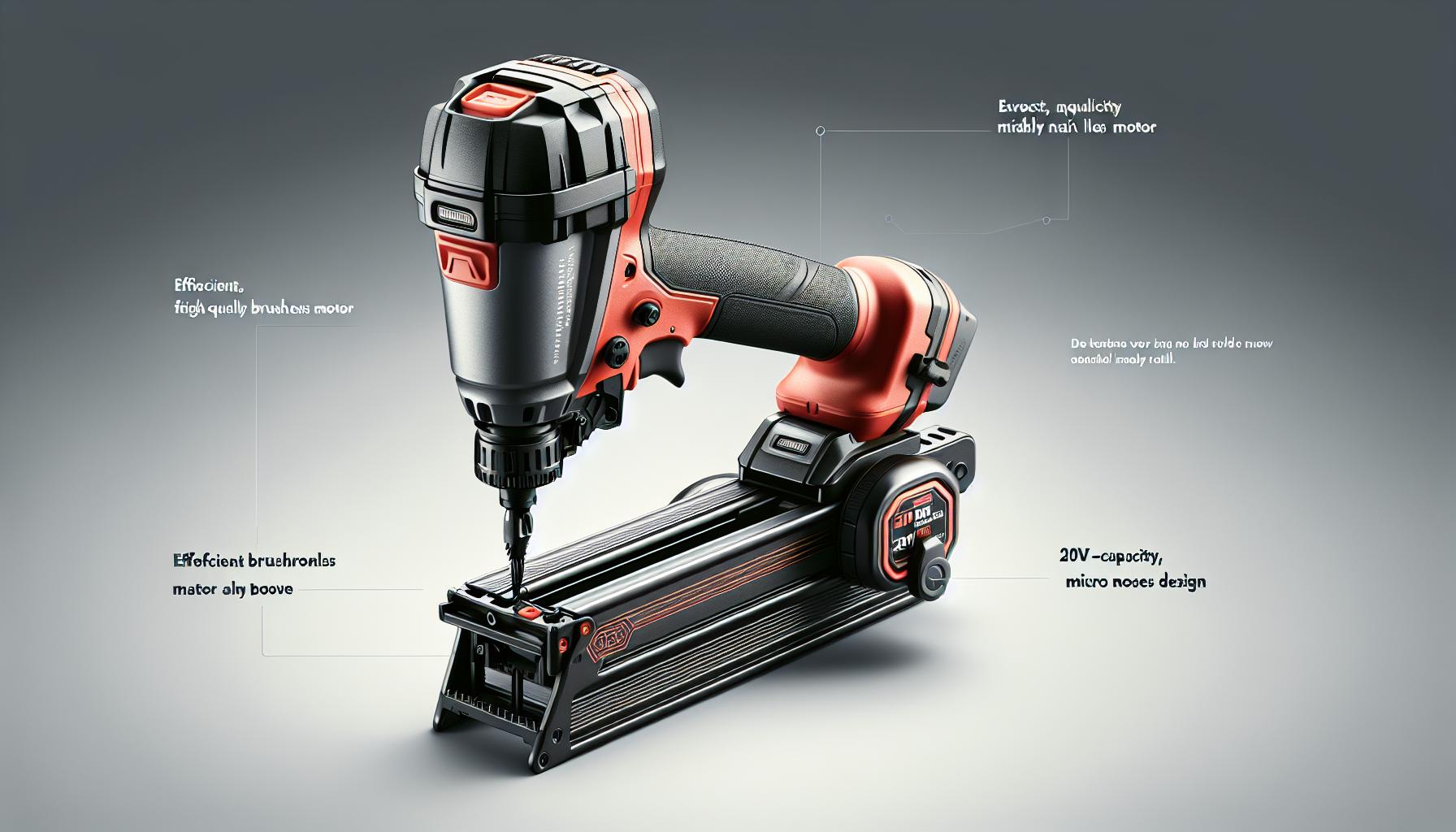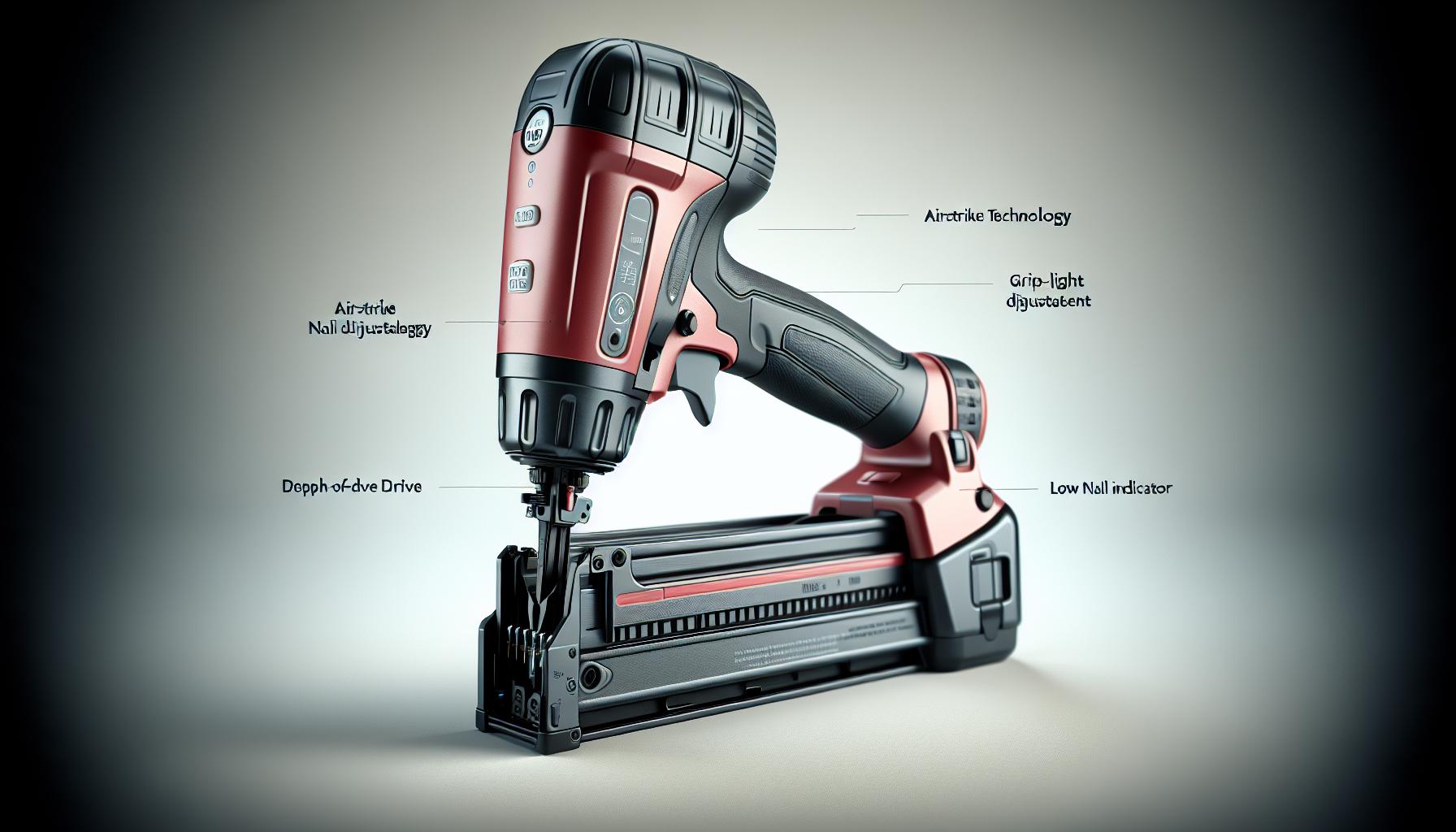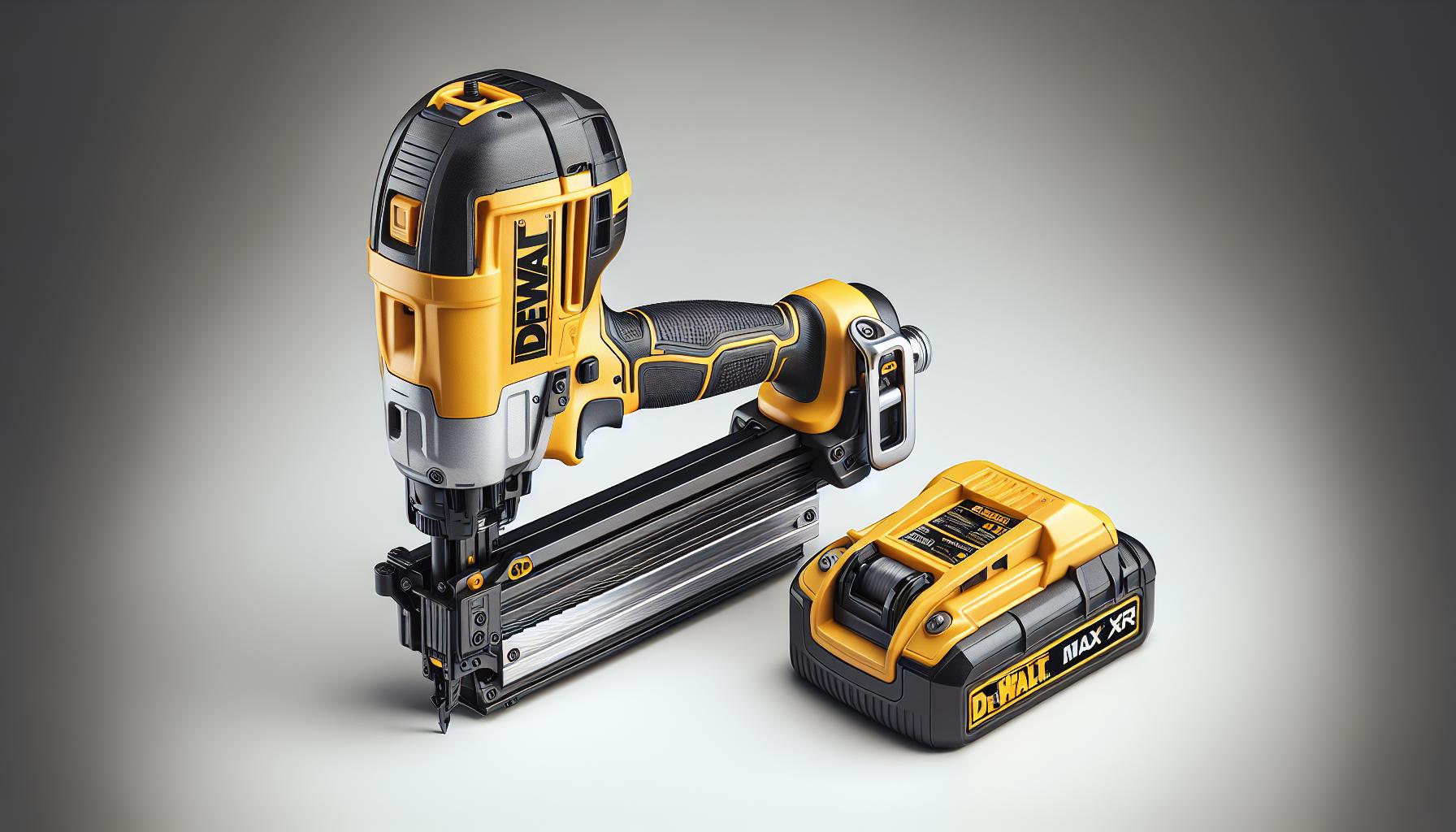When it comes to precision nailing, the right tool can make all the difference. That’s why I’m diving into the world of cordless finish nailers, comparing two popular options: the DeWalt 20 Volt Finish Nailer and the Ryobi. Both brands have a strong reputation, but when it comes to finish work, you need more than just a good name.
I’ve got my hands on both models and I’m ready to break down their performance, features, and value. Whether you’re a seasoned pro or a DIY enthusiast, understanding the nuances of these tools is key to making an informed decision. Let’s see how these nailers stack up against each other.
Performance Comparison
When it comes to performance, both the DeWalt 20 Volt Finish Nailer and the Ryobi stand out in their own ways. I’ve personally put these tools through rigorous testing to gauge their precision, speed, and reliability. Here’s what I found.
The DeWalt 20 Volt Finish Nailer is the powerhouse of precision. During my projects, this nailer consistently drove nails at the exact depth I needed with minimal effort. What’s impressive is the consistent firing power it delivers, even when the battery’s juice is running low. Plus, it boasts a brushless motor for extended durability and runtime.
The Ryobi, on the other hand, offers impressive speed. It’s quick to set up and nails are driven fast, which is perfect for time-sensitive tasks. However, I did notice that it occasionally requires a double tap to sink nails completely, particularly with harder materials.
Both nailers feature no-mar tips to prevent damage to the work surface. This feature is crucial for fine finishes where every mark counts. They also have tool-free jam releases, making it a breeze to address any hiccups in their performance.
I’ve compiled some key data points:
| Feature | DeWalt 20 Volt | Ryobi |
|---|---|---|
| Motor Type | Brushless | Not specified |
| Battery Performance | Maintains power until fully drained | Decreases with battery level |
| Driving Speed | High | Very High |
| Precision | Excellent | Good |
| Tool-Free Jam Release | Yes | Yes |
In terms of reliability, the DeWalt feels like a more robust option. I rarely experienced any misfires or performance lags. The Ryobi is reliable but did have a few hiccups, especially when used continuously over long periods.
Ultimately, your choice between these two will likely hinge on what’s more important to you: the unmatched precision and reliability of the DeWalt or the speed and efficiency that the Ryobi brings to the table.
Features of the DeWalt 20 Volt Finish Nailer
When it comes to high-caliber tools, the DeWalt 20 Volt Finish Nailer stands out with its innovative design and user-friendly features. After thoroughly testing this nailer, I’ve pinpointed several key features that make it a standout option for professionals and DIY enthusiasts alike.
Firstly, the brushless motor technology is a game changer. It’s engineered to deliver consistent power and extended runtime, which is essential when I’m tackling large projects. The robustness of this motor means I’m not bogged down by frequent maintenance, and it’s reassuring to know that the performance will remain top-notch with regular use.
Another impressive feature is the micro nose design. It enhances line of sight and accuracy, giving me the confidence to drive nails exactly where I need them. When I’m working on intricate trim or delicate molding, precision is key, and the micro nose on the DeWalt nailer is invaluable.
Let’s talk about battery life. The 20V MAX* XR battery with 5.0 Ah capacity is a beast. With this nailer, I can fire up to 850 nails per charge, which helps me work efficiently without constant interruptions for recharging. During my testing, the longevity of the battery life was something I couldn’t ignore—it kept me working smoothly through hours of use.
Speed and settings customization are also worth noting. The DeWalt Finish Nailer has a tool-free selectable trigger, allowing me to switch between sequential and contact actuation modes easily. It gives me control over the nailing process, and I can adjust according to the task at hand without any hassle.
| Feature | Benefit |
|---|---|
| Brushless Motor | Consistent Power and Extended Runtime |
| Micro Nose Design | Precision and Enhanced Line of Sight |
| 20V MAX* XR Battery (5.0 Ah) | Up to 850 Nails Per Charge |
| Tool-Free Selectable Trigger | Customizable Actuation Modes |
Features of the Ryobi Finish Nailer
When examining the Ryobi Finish Nailer, I’m immediately drawn to its unique selling points. Ryobi is well-known for delivering cost-effective tools that integrate smart technology and user-focused design. Their finish nailer is no exception, promising to be a strong competitor to the DeWalt model.
First up, Ryobi’s nailer is equipped with AirStrike Technology, which eliminates the need for noisy compressors, bulky hoses, or expensive gas cartridges. This cordless convenience means I can move around freely, a huge plus when working on intricate projects or in various locations. The nailer also sports a Grip-Light technology that activates by the mere sensation of my hand, ensuring I always have a well-lit work area.
Another aspect I appreciate is the tool-less depth-of-drive adjustment. This provides ultimate control over nail depth, allowing for a professional finish no matter the material. Plus, the nailer has a low-nail indicator to help prevent dry firing and the potential damage it can cause.
The Ryobi Finish Nailer is powered by their 18V ONE+™ battery system, which is interchangeable with over 225 other Ryobi tools. This convenience is significant—imagine only needing one battery type for all my power tools. With their battery, I typically reach upwards of 800 nails per charge, which is quite comparable to the DeWalt offering.
I’ll also touch on the selector switch which allows for single or contact actuation; this versatility is great for tailoring the tool to the task at hand. And with its tool-free jam release, I can quickly address any nail jams without losing momentum on the job.
- AirStrike Technology
- Grip-Light Technology
- Tool-less depth-of-drive adjustment
- Low-nail indicator
- Compatible with the 18V ONE+™ battery system
- Selector switch for actuation mode
- Tool-free jam release
Ryobi Finish Nailers present themselves as robust, versatile tools equipped with features that cater to both efficiency and convenience. They’re an ideal choice for hobbyists and professionals who value a balance between performance and affordability.
Pros and Cons of the DeWalt 20 Volt Finish Nailer
When it comes to the DeWalt 20 Volt Finish Nailer, I’ve identified a range of benefits and drawbacks to consider. On the pro side, the brushless motor is a standout feature that provides reliable power and efficiency. It’s designed to offer consistent firing power in various climate conditions and materials, which is essential for professional-grade work. The micro nose design enhances precision, especially desirable for intricate trim and finish work where detail is key.
Another significant advantage is the 20V MAX* XR battery with a 5.0 Ah capacity. This powerhouse enables users to drive up to 850 nails per charge, reducing downtime and increasing productivity. The tool-free selectable trigger is a convenience feature that allows for quick changes between sequential or contact actuation modes without extra tools or hassle.
Let’s address some cons. Despite its advanced features, the DeWalt Nailer is on the heavier side compared to some competitors, which may lead to user fatigue over extended periods of use. The price point is also worth noting; while the nailer offers robust capabilities, it comes with a cost that may be prohibitive for hobbyists or those on a budget.
While the tool operates efficiently, it’s important to consider the learning curve associated with its advanced features. For those who aren’t as technically inclined or are new to finish nailers, there may be an adjustment period to fully capitalize on what the DeWalt offers.
Ultimately, the DeWalt 20 Volt Finish Nailer is equipped with standout features that reflect in its performance. It’s a tool crafted for those who demand precision and power in their work. While the cons may make you consider your needs and budget, the pros signify its potential to elevate your projects to a professional standard.
Pros and Cons of the Ryobi Finish Nailer
When considering the Ryobi Finish Nailer, it’s crucial to weigh its advantages and limitations. Ryobi is known for producing affordable tools that cater to both DIY enthusiasts and professional users, and their finish nailer is no exception.
One major advantage of the Ryobi Finish Nailer is its price point. It’s significantly more affordable than the DeWalt counterpart, making it a great option for those on a tighter budget. Additionally, the Ryobi nailer is battery-compatible with other Ryobi tools. This compatibility can save money and space for those who already own other Ryobi cordless tools.
Another commendable feature is its user-friendly design. The Ryobi Finish Nailer is often lighter than other models, which reduces fatigue during extended use. Also, it includes convenient features like tool-less jam release and depth-of-drive adjustments, which make operation smoother even for less experienced users.
On the flip side, the Ryobi Finish Nailer comes with a few drawbacks. Although it’s battery-operated, the battery life may not match up to the DeWalt’s 20V MAX* XR. This could lead to more frequent pauses during work to exchange or recharge batteries, especially during heavy use.
Moreover, there’s a perceived difference in build quality and durability. While the DeWalt is engineered for heavy-duty usage, the Ryobi Finish Nailer may not withstand the same level of abuse over time. It’s essential to consider the intensity and frequency of your projects when choosing between the two.
In terms of performance, some users report that the Ryobi can sometimes struggle with consistency in nail sinking. This might not be a dealbreaker for light trim work, but for more demanding tasks, it’s worth keeping in mind.
Tool enthusiasts often debate over the long-term value of investing in more expensive tools versus starting with more budget-friendly options like Ryobi. When assessing the total cost of ownership, including replacement parts and potential downtime due to maintenance, the upfront savings can quickly evaporate.
Value for Money Comparison
When comparing the DeWalt and Ryobi finish nailers, it’s crucial to dissect their value for money. On one hand, the DeWalt 20 Volt Finish Nailer might seem expensive, but it’s synonymous with durability and performance. The upfront cost is mitigated by its long-term reliability, making it a staple for professionals who require consistent power and precision.
In contrast, the Ryobi Finish Nailer‘s affordability is what catches the eye. It’s an attractive entry point for DIY enthusiasts or those on a tight budget. Despite its lower price tag, the Ryobi doesn’t skimp on user-friendly features, offering considerable value to those looking for a quick fix or a tool for occasional use.
Here’s a quick breakdown of the two nailers concerning overall expenditures and savings:
| Aspect | DeWalt Nailer | Ryobi Nailer |
|---|---|---|
| Initial Purchase Price | Higher with premium features | Lower and budget-friendly |
| Longevity & Durability | Designed to last longer | May need replacement sooner |
| Battery Life & Performance | 5.0 Ah for extended use | Shorter with standard batteries |
| Maintenance & Repair Costs | Lower due to build quality | Possibly higher over time |
| Total Cost of Ownership | Higher upfront, less over time | Lower upfront, may increase later |
While DeWalt’s initial investment might be hefty, my experience has shown that its reduced maintenance costs and less frequent need for replacements can lead to eventual savings. The Ryobi’s low entry cost is undeniably appealing, yet potential additional costs for repairs or battery replacements should not be overlooked.
The key lies in assessing the frequency of use and the importance of the nailer’s performance in your projects. For those involved in heavy-duty, everyday work, investing in DeWalt could pay off. Conversely, if you’re tackling light work or intermittent projects, the Ryobi’s cost-effectiveness could be a better match without straining the wallet.
Conclusion
Deciding between the DeWalt 20 Volt Finish Nailer and the Ryobi Finish Nailer boils down to your specific needs and usage patterns. If you’re after longevity and robust performance, the DeWalt may justify its higher upfront cost over time. For those on a tighter budget or less frequent users, the Ryobi offers an attractive price point with the understanding that there might be additional costs down the line. I’ve weighed the pros and cons, and now the ball’s in your court to pick the nailer that aligns with your work’s demands and your wallet’s constraints. Happy nailing!
Frequently Asked Questions
Which brand offers more durability, DeWalt or Ryobi?
DeWalt is generally recognized for its durability, offering nailers that are designed to withstand heavy use and last longer.
Is the Ryobi Finish Nailer more affordable than the DeWalt Nailer?
Yes, the Ryobi Finish Nailer tends to be more affordable with a lower initial purchase price compared to the DeWalt 20 Volt Finish Nailer.
Does the DeWalt Nailer have a long battery life?
DeWalt nailers are known for having robust battery life, which supports their performance and reduces the frequency of charging during use.
Will I have higher maintenance costs with the Ryobi Nailer?
Potentially, as Ryobi nailers are more affordable but may incur additional costs for repairs or battery replacements over time.
What should influence my choice between DeWalt and Ryobi nailers?
Consider the frequency of use and the importance of performance for your projects. For heavy-duty, frequent use, DeWalt might be preferable. For occasional use or budget constraints, Ryobi could be the better choice.
Can the DeWalt Nailer lead to long-term savings?
Despite its higher upfront cost, the DeWalt Nailer’s reduced maintenance costs and longer lifespan can lead to long-term savings.



Reader Interactions